Just In
- 12 hrs ago

- 24 hrs ago

- 1 day ago

- 1 day ago

Don't Miss
- Finance
 Buy/Sell: 3 Swing Trading Call By VLA Ambala On Monday, 22 April
Buy/Sell: 3 Swing Trading Call By VLA Ambala On Monday, 22 April - Automobiles
 Evotron Motorsports' Bengaluru EV Festival: Bringing In Electric 2-Wheeler Racing
Evotron Motorsports' Bengaluru EV Festival: Bringing In Electric 2-Wheeler Racing - Movies
 Varshangalkku Shesham Box Office Collection Day 12 Prediction: Pranav & Dhyan's Movie To Sustain Momentum
Varshangalkku Shesham Box Office Collection Day 12 Prediction: Pranav & Dhyan's Movie To Sustain Momentum - News
 Lok Sabha Elections 2024: Repolling At 11 Polling Stations Of Inner Manipur Seat Begins
Lok Sabha Elections 2024: Repolling At 11 Polling Stations Of Inner Manipur Seat Begins - Sports
 RR vs MI Dream11 Prediction IPL 2024 Match 38: Squads, Fantasy Tips & Best Picks
RR vs MI Dream11 Prediction IPL 2024 Match 38: Squads, Fantasy Tips & Best Picks - Technology
 Moto G64 5G vs Vivo T3x 5G vs Realme P1 5G: Battle of the Affordable 5G Smartphones!
Moto G64 5G vs Vivo T3x 5G vs Realme P1 5G: Battle of the Affordable 5G Smartphones! - Education
 Assam Class 10 Result 2024 Declared: Anurag Emerged as the Top Performer With 593 Marks
Assam Class 10 Result 2024 Declared: Anurag Emerged as the Top Performer With 593 Marks - Travel
 Journey From Delhi To Ooty: Top Transport Options And Attractions
Journey From Delhi To Ooty: Top Transport Options And Attractions
Chickweed: Health Benefits, Side Effects And Ways To Use
Chickweed (Stellaria media (Linn.) Villars) is a plant that is found in different parts of the world, where it is mostly considered a weed and has been used for several medicinal purposes. Chickweed is also known as satin flower, starweed, white bird's eye or mouse ear that belongs to the carnation plant family (caryophyllaceae).
Chickweed is a small low-growing plant that usually grows to 18 inches, has a hairy stem, oval leaves and produces small, round white flowers. Chickweed has been used as a folk remedy for several health conditions, including asthma, constipation, arthritis and skin-related conditions.
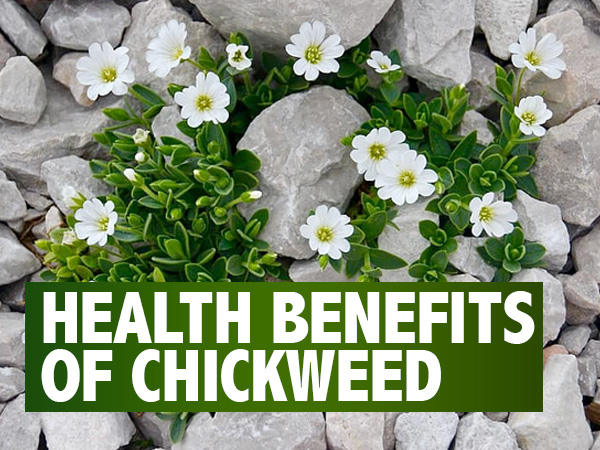
Even the flowers, leaves and stems of the plant have been used to make teas, oral decoctions and extracts. Chickweed contains many beneficial plant compounds like flavonoids, saponins, vitamin C, phytosterols, tocopherols, triterpene, gamma-linoleic acid, minerals and organic acids [1].
In this article, we'll talk about the health benefits, side effects, uses and doses of chickweed.
Health Benefits Of Chickweed
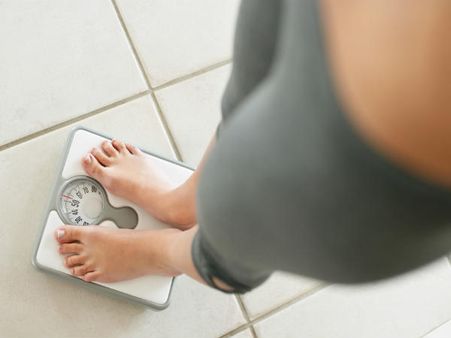
1. Aids in weight loss
Noted studies have shown the anti-obesity effects of chickweed. A 2011 study published in the journal Ayu found that chickweed extract suppressed progesterone-induced obesity in mice, which resulted in the prevention in increase in body weight, adipose tissue weight and size and obesity-related complications [2]. Another study published in the BMC Complementary Medicine and Therapies reported that obese mice were fed a high-fat diet and given freeze-dried chickweed juice for six weeks, which resulted in the prevention of weight gain [3].

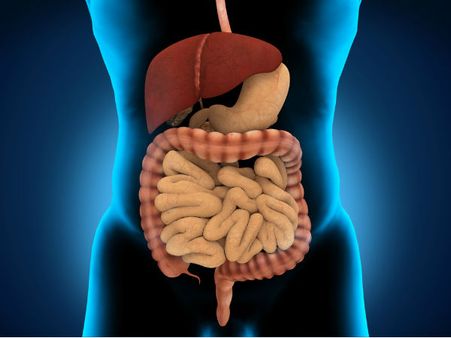
2. May support digestive health
Chickweed can help keep your digestive system healthy due to the presence of various vitamins, minerals and antioxidants in it. In folk medicine, this plant is used to help prevent or treat constipation and bloating.

3. Lowers inflammation
A review study showed that applying whole chickweed as a plaster to swollen areas and broken bones could help reduce inflammation and soothe the area. Another study showed similar anti-inflammatory effects of chickweed for arthritis pain and bronchitis [4] [5].
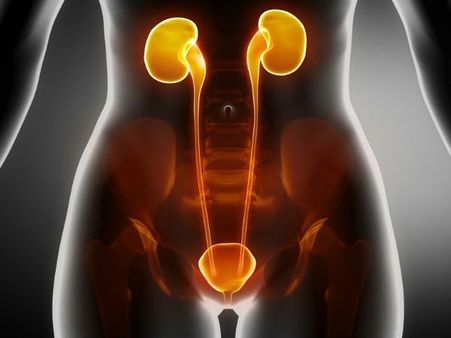
4. Has diuretic properties
Diuretics help get rid of excess salt (sodium) and water from your body. Chickweed is considered to have a mild, diuretic effect that can promote kidney and bladder health [6].

5. May treat asthma cough
As per a study, chickweed possesses expectorant and antiasthmatic properties. This means that it may help loosen the mucous and expel it out of the body, thus clearing your congested chest [7].
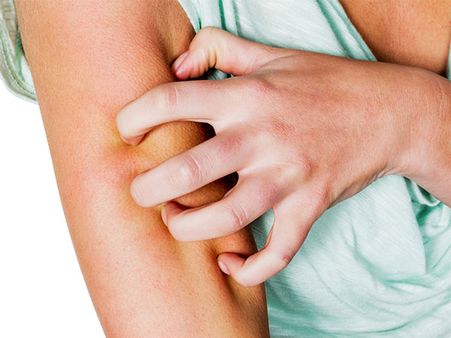
6. Treats skin diseases
For centuries, chickweed has been used in folk medicine to treat a number of skin problems like dermatitis, rashes, eczema and other skin diseases [8].In addition, chickweed is also applied for healing burns, cuts and bruises [9].

7. May fight hepatitis B virus
A 2012 study published in the journal Molecules reported the anti-HBV activity of chickweed. Chickweed contains large quantities of polyphenol and macromolecular compounds that may stop the growth of HBV. The study findings suggest that chickweed may be useful as a drug for treating HBV [10].
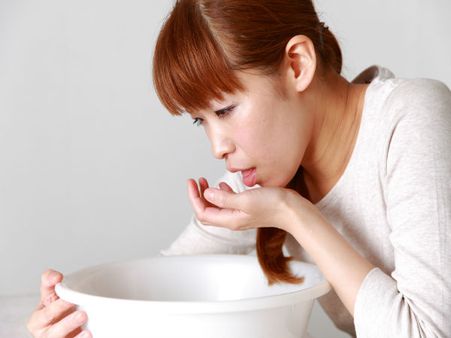
Side Effects Of Chickweed
Chickweed when applied topically is generally considered safe; however, in some people it may cause allergic reactions. Consuming high amounts of chickweed can cause side effects such as diarrhoea, nausea, vomiting and upset stomach. This may be due to the presence of saponins in chickweed [11].
Also, there's not enough evidence to show if chickweed is safe to use when pregnant or breastfeeding, therefore it should be avoided.
If you want to use chickweed and do not know the right dosage, it is recommended to consult your doctor before using it.
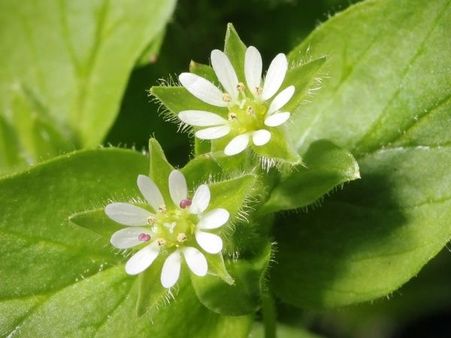
Ways To Use Chickweed
Chickweed can be used in many ways:
- The whole chickweed plant may be applied topically on the skin to lower inflammation.
- You can add chickweed-infused oil to your bath water or apply it on your skin. You can make chickweed-infused oil by chopping up fresh chickweed leaves and allow them to wilt for 24 hours. Then blend the leaves with small amount of coconut oil in a blender. Boil this mixture until it's warmed and remove it from the heat and let it sit for three hours. Repeat this warming step four times and the oil is ready to use.
- You can also consume chickweed tea. You can make it by adding few chickweed leaves to boiling water and allowing it to steep for about 10-15 minutes. Strain the leaves and enjoy the tea.
- You can also add chickweed in omelettes, pasta sauces, soups, stews, smoothies, salad or pizzas.
Note: Before you use chickweed in any form, it is recommended to consult your doctor first to avoid any kind of adverse health effects.
Common FAQs
Q. Does chickweed help with weight loss?
A. Yes, animal studies have shown that chickweed has anti-obesity effects.
Q. What does chickweed taste like?
A. Chickweed has a pleasant and mild taste.
Q. What does chickweed look like?
A. Chickweed is a small low-growing plant that usually grows to 18 inches, has a hairy stem, oval leaves and produces small, round white flowers.
-
 healthDo You Keep A Clove Of Garlic Under Pillow? Not To Keep Vampires At Bay, There May Be Scientific Reasons
healthDo You Keep A Clove Of Garlic Under Pillow? Not To Keep Vampires At Bay, There May Be Scientific Reasons -
 healthGet Your Groove On: 5 Health Benefits Of Dancing To Afro Beats
healthGet Your Groove On: 5 Health Benefits Of Dancing To Afro Beats -
 healthIndigenous Delicacies: 5 Rare Indian Wild Foods That Are So Healthy You Should Try It!
healthIndigenous Delicacies: 5 Rare Indian Wild Foods That Are So Healthy You Should Try It! -
 healthHaving Chicken Soup At Home Can Cure These Health Issues
healthHaving Chicken Soup At Home Can Cure These Health Issues -
 healthBoost Your Health with Beetroot: Health Benefits And Ways To Add The Colourful Veggie In Your Diet
healthBoost Your Health with Beetroot: Health Benefits And Ways To Add The Colourful Veggie In Your Diet -
 healthHealth Benefits Of Garam Masala: From Digestion To Weight Loss, Proper Use Can Yield Many Benefits
healthHealth Benefits Of Garam Masala: From Digestion To Weight Loss, Proper Use Can Yield Many Benefits -
 healthAyurvedic Wisdom: Panchamrit's Surprising Health Benefits
healthAyurvedic Wisdom: Panchamrit's Surprising Health Benefits -
 healthUnveiling the Power of Turmeric Ghee: An Ancient Ayurvedic Secret!
healthUnveiling the Power of Turmeric Ghee: An Ancient Ayurvedic Secret! -
 healthPlant-Based Diet And Nutrition: Your Key To A Stronger Immune System!
healthPlant-Based Diet And Nutrition: Your Key To A Stronger Immune System! -
 healthExperience the Healing Power of Indian Herbal Teas!
healthExperience the Healing Power of Indian Herbal Teas! -
 healthInternational Cat Day 2023: Did You Know That Cat Purring Can Benefit Your Health? Check Out How!
healthInternational Cat Day 2023: Did You Know That Cat Purring Can Benefit Your Health? Check Out How! -
 healthHeart-Healthy Breakfast: Discover The Benefits Of Frozen Strawberries
healthHeart-Healthy Breakfast: Discover The Benefits Of Frozen Strawberries


 Click it and Unblock the Notifications
Click it and Unblock the Notifications





